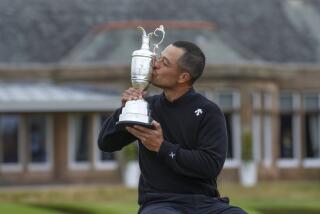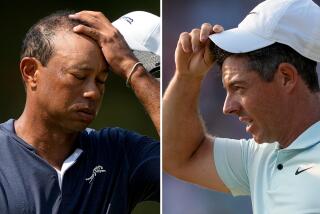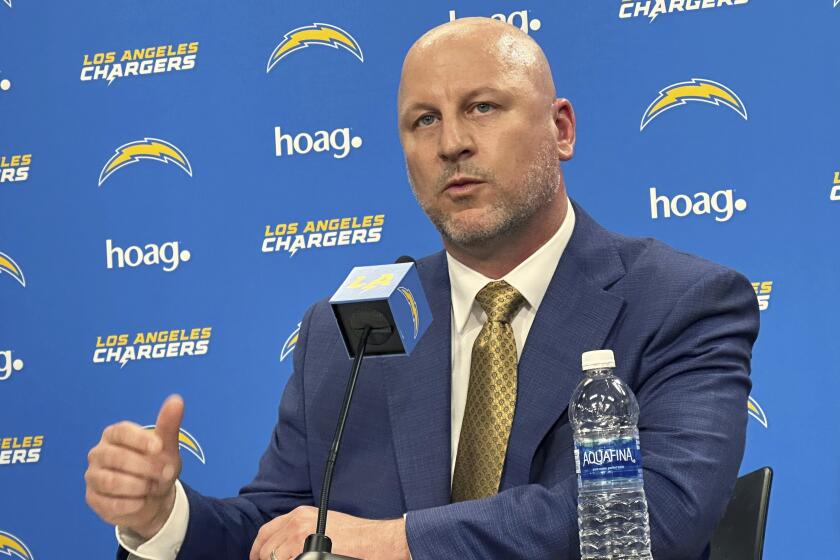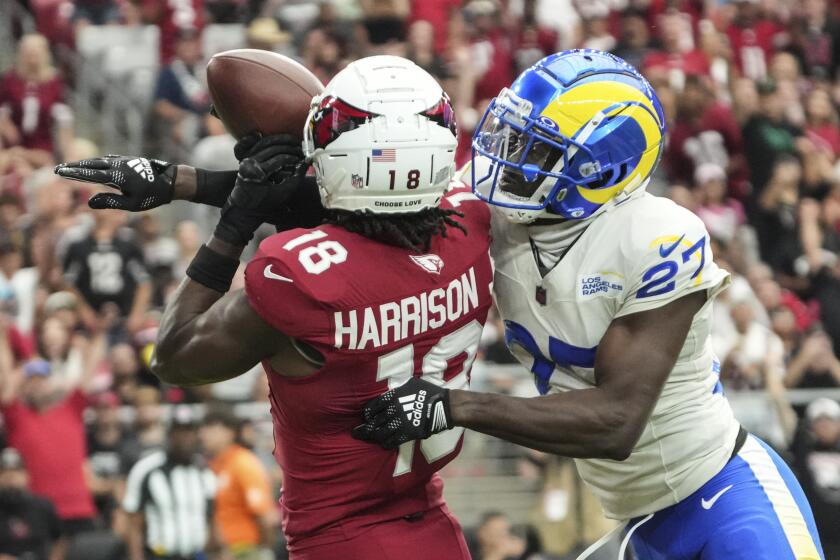Darren Clarke’s victory is an occasion for laughter and tears
From Sandwich, England — There is little doubt that there will be lots of Guinness drunk from the Claret Jug in the next few weeks. Make that months.
Late Sunday afternoon, with the rain symbolically pausing over the 18th green on the links of Royal St. George’s legendary course, a 42-year-old man with thinning gray hair, a beer belly and a wonderfully aged golf swing tapped in a three-inch putt for the happiest bogey of his life.
Darren Clarke had become the British Open champion. He had also become one of the most popular ever.
It was the 20th time he had tried to win the treasured trophy. It took him longer to win it than any other entrant. With his 43rd birthday looming Aug. 14, he became the oldest British titlist since Roberto de Vicenzo in 1967. It was his 460th European Tour event, his 54th major championship and his first major title.
This victory was not only unlikely and totally unpredictable, but also one that made everybody laugh and cry.
Clarke was asked why he had become so popular.
“Because I’m a bit of a normal bloke, aren’t I, really?” he said. “I like to grab a pint … jump on an EasyJet, fly home and buy a round.”
Home for years was London. Now it is Portrush in Northern Ireland, a country with a population about that of Las Vegas and one that has a heavy grip on the major golf tournaments. Clarke’s victory was the third in a major by a Northern Ireland golfer in the last six Grand Slam events. Graeme McDowell won the U.S. Open in 2010 at Pebble Beach and Rory McIlroy the U.S. Open at Congressional last month.
Despite the age difference — McDowell is 32 and McIlroy 22 — they are all good friends and lead the cheers for one another. They also are drinking buddies. When McDowell won at Pebble Beach, McIlroy said later that they partied for a week. When McIlroy won his U.S. Open and headed home to celebrate, Clarke canceled out of his next tournament so he wouldn’t miss the parties.
“We’re blessed with two fantastic players, Rory and G-Mac,” he said, “and I’m the old guy, coming along behind them.
Clarke, certainly not the prototypical slim-and-trim tour golfer, enjoys having fun with his weight. That would, of course, befit somebody who has had as his manager since he began his pro career in 1990 a man named Chubby. Clarke said Chubby Chandler, whose name defines his body shape, is pushing him toward going on a diet.
“Weight Watchers starts next week,” Clarke said, pausing before adding, “Next week might not be a good week to start.”
He poked fun at a local writer, and himself at the same time, when he remembered one of the writer’s lines during recent years when Clarke’s game was trending more toward bogey than birdie.
“Let me recollect your line,” Clarke teased. It was “ ‘He’s in his inexorable slide toward irrelevance …’ ”
The side of the Clarke story that brings sadness rather than laughter is that he lost his wife to breast cancer the day before his 38th birthday in 2006. In his speech at the trophy ceremony Sunday, he made reference to “somebody up there watching,” and the story is so well-known that the reference was lost on no one. In his news conference, he said it again, that “somebody was looking down from up there,” and added, “she’d probably be saying, ‘I told you so.’ ”
He then told the story of the Ryder Cup at the K Club near Dublin in 2006, when the European and U.S. teams marched in opening and closing ceremonies and the numbers worked out such that he was marching on his own. So he said the Mickelsons, Phil and Amy, who herself battled breast cancer, walked with him.
“Amy stood in the middle and held both of our hands,” Clarke said.
Interestingly, it was Mickelson, normally a disaster on British Open links courses, who took the best run at Clarke on a final Sunday when it rained, blustered and did everything that a British Open is supposed to do to its golfers. Mickelson shot an unbelievable five-under-par 30 on the front nine and pulled even with Clarke at five under overall by making an eagle on the par-five seventh hole.
And he had a birdie putt on No. 8 to take an outright lead, but when Clarke eagled the seventh hole, Mickelson’s title run was over.
In the end, Clarke was spectacularly steadfast — or maybe it was the other way around.
On a golf course that treats birdies like intruders, that played to a par 70, and that threw every kind of nasty weather except ice storms at the players for most of the four days, Clarke shot 68-68-69-70. A field of 156 started Thursday, and only four ended up beating par.
Royal St. George’s had its final say with Mickelson when he hit his approach shot on No. 18 into the bleachers. It did similarly with the only other real challenger to Clarke. That was Dustin Johnson, who hit out of bounds on No. 14.
By then, a huge gallery had gravitated to the 18th fairway and green. A favored son from the United Kingdom had a chance to win, and they wanted to be part of that history.
While they watched Davis Love III putt out five groups ahead of Clarke and Johnson, the giant scoreboard suddenly showed Johnson going from five under to three under. The buzz said it all. Clarke would win.
But not until his second shot on the par-four 18th had settled just off the green, 40 feet away, did they know for sure. He could five-putt from there and win.
To them, and to most, this one felt right. He who had weathered hundreds of storms in golf, and at least one severe one in life, was the last man standing.
All that was left was the universal advice for such a grand moment.
Be thirsty, my friend.
More to Read
Go beyond the scoreboard
Get the latest on L.A.'s teams in the daily Sports Report newsletter.
You may occasionally receive promotional content from the Los Angeles Times.











